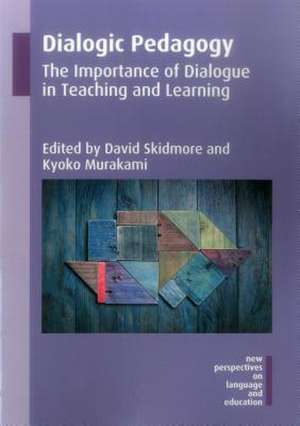Dialogic Pedagogy: New Perspectives on Language and Education
Editat de David Skidmore, Kyoko Murakamien Limba Engleză Paperback – aug 2017
Din seria New Perspectives on Language and Education
-
 Preț: 274.02 lei
Preț: 274.02 lei -
 Preț: 230.11 lei
Preț: 230.11 lei -
 Preț: 229.22 lei
Preț: 229.22 lei -
 Preț: 312.19 lei
Preț: 312.19 lei -
 Preț: 228.82 lei
Preț: 228.82 lei -
 Preț: 229.45 lei
Preț: 229.45 lei -
 Preț: 229.99 lei
Preț: 229.99 lei -
 Preț: 272.86 lei
Preț: 272.86 lei -
 Preț: 311.43 lei
Preț: 311.43 lei -
 Preț: 311.48 lei
Preț: 311.48 lei -
 Preț: 273.15 lei
Preț: 273.15 lei -
 Preț: 312.64 lei
Preț: 312.64 lei -
 Preț: 190.90 lei
Preț: 190.90 lei -
 Preț: 312.44 lei
Preț: 312.44 lei -
 Preț: 273.25 lei
Preț: 273.25 lei -
 Preț: 191.54 lei
Preț: 191.54 lei -
 Preț: 230.70 lei
Preț: 230.70 lei -
 Preț: 273.97 lei
Preț: 273.97 lei -
 Preț: 230.37 lei
Preț: 230.37 lei -
 Preț: 312.60 lei
Preț: 312.60 lei -
 Preț: 273.29 lei
Preț: 273.29 lei -
 Preț: 543.95 lei
Preț: 543.95 lei -
 Preț: 229.99 lei
Preț: 229.99 lei -
 Preț: 312.19 lei
Preț: 312.19 lei -
 Preț: 311.97 lei
Preț: 311.97 lei - 18%
 Preț: 689.16 lei
Preț: 689.16 lei -
 Preț: 191.32 lei
Preț: 191.32 lei -
 Preț: 229.55 lei
Preț: 229.55 lei -
 Preț: 298.41 lei
Preț: 298.41 lei - 23%
 Preț: 887.39 lei
Preț: 887.39 lei - 23%
 Preț: 775.87 lei
Preț: 775.87 lei -
 Preț: 258.50 lei
Preț: 258.50 lei -
 Preț: 256.38 lei
Preț: 256.38 lei -
 Preț: 254.25 lei
Preț: 254.25 lei -
 Preț: 370.80 lei
Preț: 370.80 lei -
 Preț: 293.54 lei
Preț: 293.54 lei -
 Preț: 369.65 lei
Preț: 369.65 lei -
 Preț: 295.45 lei
Preț: 295.45 lei -
 Preț: 257.51 lei
Preț: 257.51 lei -
 Preț: 296.42 lei
Preț: 296.42 lei - 23%
 Preț: 772.04 lei
Preț: 772.04 lei -
 Preț: 260.57 lei
Preț: 260.57 lei -
 Preț: 294.29 lei
Preț: 294.29 lei
Preț: 372.62 lei
Nou
Puncte Express: 559
Preț estimativ în valută:
71.30€ • 74.45$ • 58.88£
71.30€ • 74.45$ • 58.88£
Carte tipărită la comandă
Livrare economică 15-29 aprilie
Preluare comenzi: 021 569.72.76
Specificații
ISBN-13: 9781783098408
ISBN-10: 1783098406
Pagini: 264
Dimensiuni: 156 x 234 x 14 mm
Greutate: 0.41 kg
Editura: MULTILINGUAL MATTERS
Seria New Perspectives on Language and Education
ISBN-10: 1783098406
Pagini: 264
Dimensiuni: 156 x 234 x 14 mm
Greutate: 0.41 kg
Editura: MULTILINGUAL MATTERS
Seria New Perspectives on Language and Education
Notă biografică
David Skidmore is Senior Lecturer in Education at the University of Bath, UK. He has worked in the field for over 20 years and is a member of the editorial board of Language and Education. His research interests include pedagogy, dialogue, inclusive education and prosody.
Kyoko Murakami is Associate Professor in the Department of Psychology at the University of Copenhagen, Denmark. Her research interests include social remembering, discursive psychology, cultural psychology, cultural historical activity theory, dialogic pedagogy and social and community psychology.
Kyoko Murakami is Associate Professor in the Department of Psychology at the University of Copenhagen, Denmark. Her research interests include social remembering, discursive psychology, cultural psychology, cultural historical activity theory, dialogic pedagogy and social and community psychology.
Descriere
This book provides a wide-ranging and in-depth theoretical perspective on dialogue in teaching. It explores the philosophy of dialogism and explains its importance in teaching and learning. The authors present the core concepts of dialogism as a social theory of language and consider the implications of these ideas for pedagogy.
